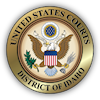 FRIDAY, JANUARY 02, 2026
FRIDAY, JANUARY 02, 2026 IMAGE: "Sawtooth National Forest - Stanley, Idaho"
U.S. DISTRICT COURT
District of Idaho
Chief Judge Amanda K. Brailsford
Public 2 New

 FRIDAY, JANUARY 02, 2026
FRIDAY, JANUARY 02, 2026 Federal court jurisdiction is limited to certain kinds of cases listed in the Constitution. For the most part, federal courts hear cases in which the United States is a party, cases involving violations of the Constitution or federal law, crimes on federal land, and bankruptcy cases.
The federal civil litigation system in particular is filled with a variety of business-related disputes. These may include actions concerning contracts, copyrights, trademark infringement, antitrust and unfair competition, employment discrimination, and environmental issues.
A civil petit jury is typically made up of 6 to 12 persons. In a civil case, the role of the jury is to listen to the evidence presented at a trial, to decide whether the defendant injured the plaintiff or otherwise failed to fulfill a legal duty to the plaintiff, and to determine what the compensation or penalty should be.
A criminal petit jury is usually made up of 12 members. Criminal juries decide whether the defendant committed the crime as charged. The sentence usually is set by a judge.
Verdicts in both civil and criminal cases must be unanimous, although the parties in a civil case may agree to a non-unanimous verdict. A jury's deliberations are conducted in private, out of sight and hearing of the judge, litigants, witnesses, and others in the courtroom.